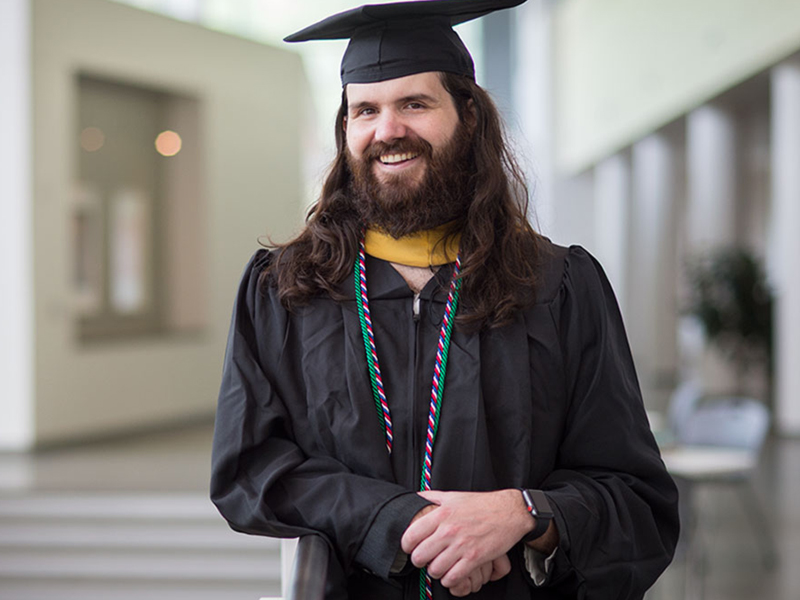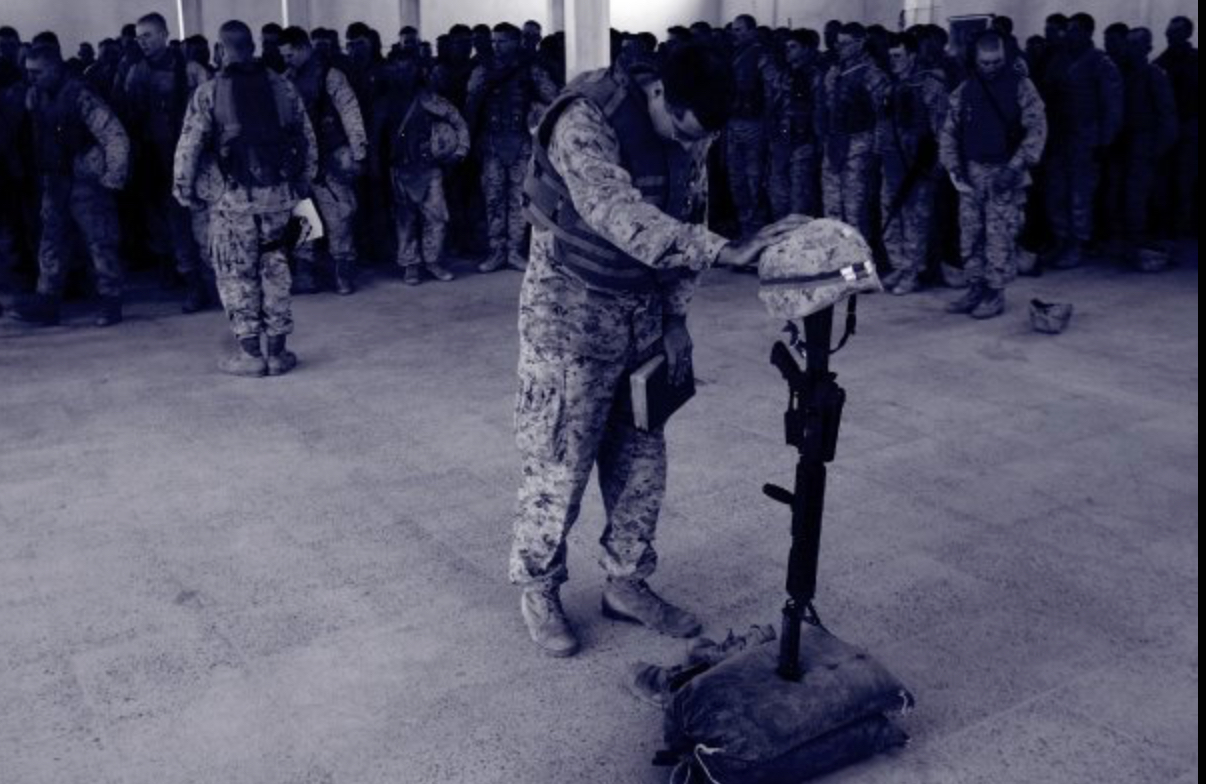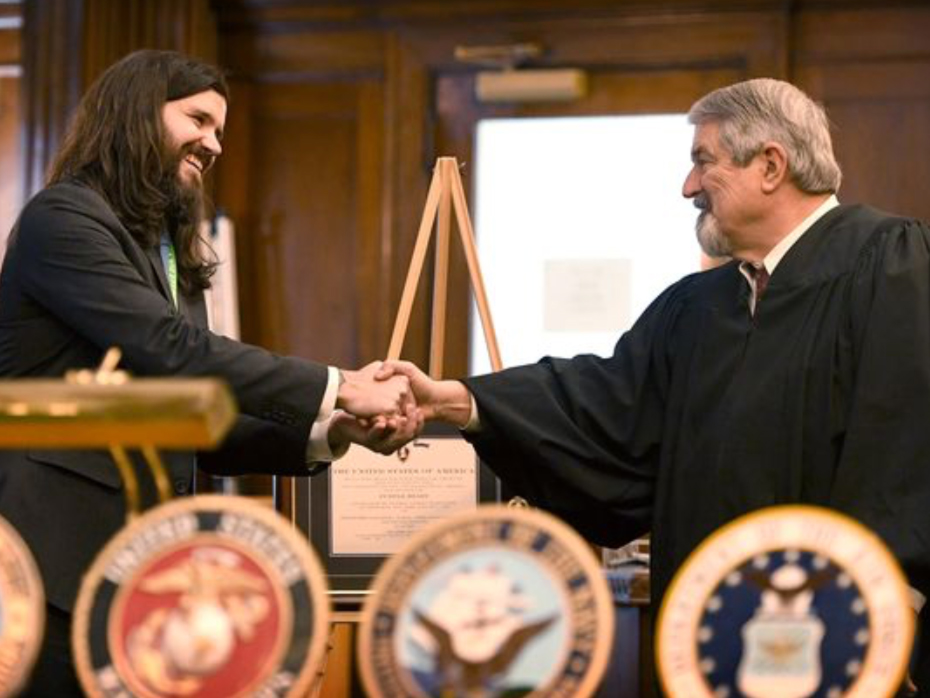- Admissions & Aid
- Decide to Succeed
- Stories
- Kevin Rumley
Graduating Veteran Finds Peace After 'Journey of a Million Steps'

There is a rhythm to the madness that once defined Kevin Rumley’s life. (Figures. The dude’s a drummer.) But now, there’s only rhythm. No madness. Just peace, love and joy – mostly. And purpose – definitely purpose.
Rumley, 34, graduated from Western Carolina University in May 2018 with a master’s degree in social work, a once seemingly impossible achievement for a homeless veteran suffering from drug addiction, who spent much of his combat pay on opioids before switching to heroin when his money ran low. But, he overcame the odds through grit and determination, and he now works to help other veterans realize recovery is possible.
Rumley is now coordinator of the Buncombe County Veterans Treatment Court (VTC) in Asheville, an intensive program that focuses on recovery instead of punishment for offenders. He credits WCU with helping him to reach his goal of supporting other veterans and in many ways, himself.
“WCU created new pathways to success by introducing me to community-based providers and the director of the Veterans Treatment Court,” Rumley said. “It was because of the relationships that Western had already established in the community that I was able to get my foot in the door, professionally at the VTC. From the time I started as a social work intern at the VTC to being hired as its coordinator, WCU’s faculty and staff really supported my journey and guided my clinical growth.”

Life wasn’t always so accommodating for Rumley. He was a 20-year-old Marine lance corporal when he was nearly killed by an improvised explosive devise while on patrol on April 7, 2004, in Husaybah, Iraq, at the Syrian border. The explosion killed his best friend and blew out Rumley’s knees and femur and left his body full of shrapnel. He spent 18 months at Walter Reed National Military Medical Center in Bethesda, Maryland – very near his home in Fairfax, Virginia – where he had 32 surgeries and was told he would never walk again. (He did.)
Rumley had joined the Marine Corps in 2003, right after graduating from high school, to travel and see the world. Less than a year in, he was hospitalized in his own backyard, 100-percent disabled and suffering from addiction. He sank deep into despair. And then the hospital released him. “I was so young. At the time, I remember thinking, ‘I’m done. I’ve lost my friends, I’m over the Marine Corps, I’m moving out of Northern Virginia and I want that all in my rearview mirror,’" Rumley said.
“This was early in the buildup of troops in Iraq, and the process of discharging a veteran after a year and a half in the hospital was new. There wasn’t the Wounded Warrior Project yet, so I was new to this process, too. I remember they gave me a bagful of meds – opioids – and I hit the road,” he said.
But, he didn’t know where to go, so he spent a year couch surfing with friends, getting high, getting drunk, traveling, searching and hurting. Always hurting. “I was full of guilt and shame because my best friend had died and I didn’t have the courage to commit suicide,” Rumley said. “I had also been ripped from my tribe, my brothers. I didn’t have a purpose, an identity. Those are the things we talk about in social work classes, these four existential truths that we all desire, and I had lost my friends. So, I was homeless and hopeless.”
After a short stint living with his dad, Rumley moved to Asheville in 2006 to live with his brother, Matt, but he quickly moved out. The addiction had taken over. “I would run out of meds early and go to the street, which isn’t a pharmacy. That’s how it spiraled out of control,” Rumley said. “The only reason I was able to transform and change was because my brother took me to the Charles George VA.”
Rumley spent two weeks in the VA’s psychiatric inpatient program, where he started medication-assisted treatment, a combination of Suboxone, which reduces the desire for heroin and opioids, and individual and group counseling. “Suboxone saved my life and that’s something I’m a big advocate of. So much of this old conversation is you’re either using or you’re not. You’re either not yet in recovery or you’re clearly still an addict. But, there is a continuum of recovery and that includes managing addiction as a chronic disease."
Rumley’s brother also had urged him to enroll at the University of North Carolina Asheville, which Rumley did, shortly after he arrived in Asheville. He earned a degree in public health, going part-time for nearly seven years and graduating in 2013.
The new degree landed Rumley a job in community mental health, where he noticed most of his co-workers had master’s degrees in social work. The field intrigued him, he said, because social work “isn’t telling people how to live. It’s a lot like how my older brother treated me, it’s unconditional support, helping them problem solve, empowering other people to make pathways to change.”
Rumley enrolled in WCU’s social work program where he learned not only to help others, but to help himself, as well. “It was through WCU that I came to appreciate the healing power of the human connection,” Rumley said. “Beyond all of the interventions, therapeutic modalities, policy/practice, and didactic learning at WCU, it was the relationships with faculty and staff that strengthened my own recovery process and gave me the courage to advance forward.”
His determination to succeed did not go unnoticed. “The challenges he has faced in his life have given him the heart, the vision and the strength to help others,” said Patricia Morse, head of WCU’s Social Work Program.

And that is why Rumley can say with complete honesty that the explosion on April 7, 2004, that nearly killed him was a good thing. “I have the space now and the distance where I am grateful that it happened,” Rumley said. “A lot of opportunities have stemmed from that. At the time and for seven years, I was addicted to opioids and really struggled. But I am now in long-term recovery, I have eight years clean and it opened my eyes to the support our veterans need and my own personal experience. I’m passionate about helping veterans who are now in the same situation I was.”
Is he surprised that such a horrific event can be the catalyst for joy? Yes, he said. “The transformation did not occur overnight, but was instead a journey of a million steps. It wasn’t until I achieved my goal of graduating with my bachelor’s degree that I felt a sense of wonder and awe of the tragic experience of death and loss in Iraq, wonderment that I was alive and realizing that life is precious,” he said.
“There is something to be said about looking back,” he said. “It was in 2013 when I began to realize that I had the power to change my story. I had ownership over my story, and I was able to finally see myself in a different light. As a social worker, this 'change' is the crux of our profession, how we can facilitate in this process of growth, change and transformation. A beautiful thing.”
By Melanie Threlkeld McConnell

